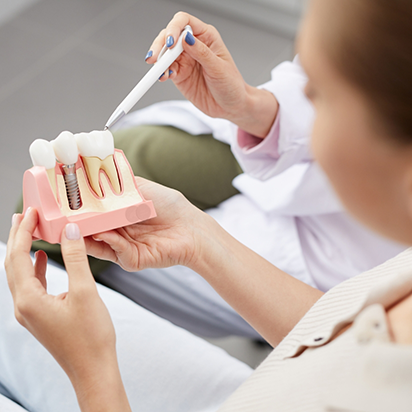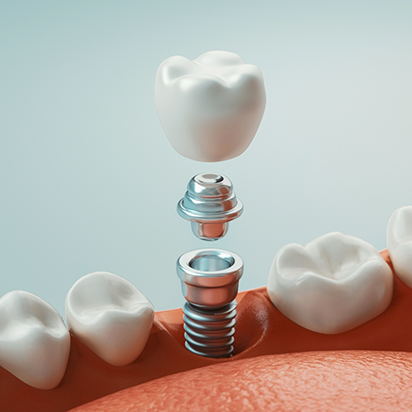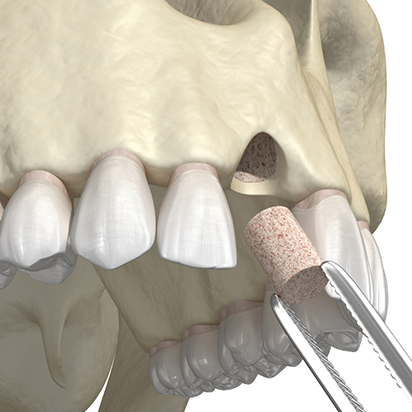Dental Implants Morgan Hill
Enjoy a Restored Smile & All Its Benefits

Dental implants have been considered the “gold standard” for replacing missing teeth for quite some time – these posts are capable of restoring one or multiple lost teeth in terms of look, feel, and functionality. They also offer several unique benefits that dentures, bridges, or other types of restorations cannot match. To learn more about dental implants in Morgan Hill and how they can restore your smile and improve your quality of life, feel free to contact our team at Morgan Hill Dental Care!
Why Choose Morgan Hill Dental Care for Dental Implants?
- Team with Several Years of Experience with Implant Placement
- Advanced Dental Technology for a Streamlined Patient Experience
- Insurance Accepted and Flexible Financing Options Available
What Are Dental Implants?

Dental implants refer to small posts that are surgically placed beneath a patient’s gumline, directly into their jawbone. These posts are made from biocompatible materials such as titanium and zirconia, meaning they’re capable of fusing with the jawbone and functioning as replacement tooth roots – something other dental restorations can’t do. By replacing the roots of missing teeth, they offer incredible stability for a corresponding dental restoration, as well as unmatched oral functionality. They can last for several decades under ideal circumstances.
The 4-Step Dental Implant Process

- Initial Dental Implant Consultation – The first step of the dental implant process involves coming in for a consultation. Patients need to be in good oral health and have sufficient jawbone density to receive dental implants, and we can quickly determine if you’re a good candidate. Some patients may need periodontal treatment, a bone graft, or another type of preliminary procedure before they can receive their implants.
- Dental Implant Surgery – We’re proud to be able to complete the entire dental implant process in-house, meaning you won’t have to coordinate with other teams or other offices. As for the actual procedure, it’s surprisingly straightforward, completely pain-free, and often only takes one appointment (though this also depends on the number of implants being placed).
- Dental Implant Osseointegration/Abutment – Once they’ve been placed, the implants will begin fusing with your jawbone over the next several months. This part of the process, known as osseointegration, must occur in order for the implants to remain stable. Once this has happened, we can call you back to attach your abutments, which eventually secure your replacement teeth.
- Delivery of Dental Implant Restoration(s) – Dental implants can be used to support virtually any type of dental restoration, no matter how many teeth are missing. Based on your needs, we’ll provide you with a functional, beautiful restoration that looks and feels just like your original teeth!
Benefits of Dental Implants

Whether you’re missing one tooth, multiple ones, or missing all your teeth, you can rebuild a complete and beautiful smile with dental implants! According to statistics, roughly 3 million people have already received dental implants, with that number increasing at a staggering rate of 500,000 per year! The soaring popularity of dental implants is attributed, in large part, to the numerous benefits they offer as compared with other methods of care.
While conventional fixed bridges and dentures provide effective and satisfying solutions for the replacement of missing teeth, dental implants offer several advantages over traditional methods of care:
- Dental implants come the closest to replicating the look, feel, and function of natural teeth.
- With precise placement, good oral hygiene, and routine care, dental implants can last for many years.
- Dental implants provide continued stimulation to the underlying bone to prevent the bone loss that occurs when teeth are missing while preserving natural facial contours.
- Since implants behave like natural teeth, there is no chance that they will slip or dislodge like removable dentures when speaking or eating.
- Dental implants make it possible to speak with ease and eat and taste all types of food with virtually no restrictions.
- Dental implants do not decay and will not develop cavities.
- Unlike a fixed bridge, dental implants do not require any preparation or preparation of natural teeth.
Bone Grafts

According to clinical studies, dental implants have a demonstrated long-term success rate of well over 95%. However, the long-term stability and success of a dental implant depends upon a number of factors, like the presence of sufficient bone at the time of placement. In cases of periodontal disease or following the extraction of a tooth, bone volume is often lost. By placing a bone graft in the extraction site, or prior to the placement of a dental implant, we can establish sufficient bone support for a sturdy and stable dental implant.
Cost of Dental Implants

Dental implants are the best tooth replacement option out there. However, many patients are hesitant to commit to treatment due to fear of cost. Everyone’s treatment is a little bit different, so the cost varies from patient to patient. During your consultation, we will go over the estimated cost of your treatment in detail. Until then, here are some things to take into consideration.
Preliminary Treatments & Dental Implant Surgery

Sometimes, patients need preliminary treatment before they can get dental implants. This includes things like gum disease treatment, tooth extractions, bone grafting, sinus lifts, and other services. It is important to consider the cost of these procedures if they apply to you. The good news is that the cost of preliminary procedures often receives partial coverage if you have dental insurance. Remember that every plan is a little bit different, so it is best to contact your provider ahead of time to confirm your coverage.
The Parts of Your Dental Implant

There are numerous factors that contribute to the cost of dental implants. Here are the most prominent ones:
- Number of Dental Implants: The number of teeth that you are missing, and their locations determine the number of dental implants you need. The more implants, the higher the cost.
- Restoration Type: Dental crowns, bridges, and dentures all have different costs. Generally speaking, the larger the restoration, the higher the cost.
- Materials: In most cases, dental implants are crafted from surgical titanium. However, they are also sometimes made from zirconia.
- Brand: Just like other products, dental implants come from a variety of manufacturers. This influences the cost.
How Dental Implants Can Save You Money

It is tempting to try to save money by choosing a more affordable tooth replacement option, like dentures. Dentures are ideal for many people, but they don’t provide the same lifelong benefits that dental implants do. Dental implants can help you save money in the long run. This is because you will no longer need to spend money on frequent repairs and replacements, and you don’t’ need to stock up on adhesives and soaking solutions to maintain your smile. Dental implants help to prevent serious oral health issues, meaning that you can avoid costly restorative treatment in the future.
Does Dental Insurance Cover Dental Implants?

Dental insurance does not usually cover the cost of dental implants themselves. That being said, it does often cover parts of the costs of preliminary procedures and the restoration that is attached to the implants. Keep in mind that every dental insurance plan is a little bit different, so coverage can vary. At Morgan Hill Dental Care, we are proud to be in-network with Delta Dental PPO, and we are happy to file claims on your behalf. If you have any questions or concerns regarding your benefits, don’t hesitate to contact us.
Making Dental Implants Affordable

If you don’t have dental insurance or you don’t have coverage for your treatment, this doesn’t mean that you will be left completely on your own. With our In-House Dental Savings Plan, you can save on services completed at our practice. We are also happy to accept payments through CareCredit and Sunbit financing. These third-party financing companies can split the cost of your treatment into manageable monthly installments with little to no interest. If you have questions or need help applying, give us a call!
Dental Implant FAQs
What is the best method of replacing missing teeth? Are dental implants worth it?
If you've lost a tooth due to injury, decay, gum disease, or any other reason, we recommend dental implants to replace missing teeth. Dental implants come the closest to replicating the look, feel, and function of your natural teeth.
Are dental implants painful?
Dental implants are placed into the jawbone and mirror the same function as the root of a tooth. The procedure for dental implants is usually performed while a patient is sedated. Patients who undergo IV sedation must have an empty stomach and transportation home following the procedure. Most sedation patients will have little to no memory of the procedure occurring.
What are dental implants made of?
Generally, dental implants are made out of a biocompatible metal such as titanium. Biocompatible metals are also used for other common bone implants (such as shoulder, hip, and knee replacements). The visible portion of the implant is usually made out of porcelain and is custom-made to match your existing teeth.
Are dental implants permanent?
Dental implants are designed to fuse to the bone, which makes them become permanent fixtures. Typically speaking, the success rate is nearly 100%. There are few cases in which the implant will not fuse as intended and must be removed. If this happens to occur, the procedure can be attempted again a few months later.
Are dental implants expensive?
Dental implants are not usually covered by dental insurance, but may be covered under a patient's medical insurance. Our office and your insurance company can discuss coverage options with you based on your individual case and treatment plan.
I Need a Checkup & Cleaning I am Worried About Gum Disease I Need a Dentist for My Child I Have a Cavity or Broken Tooth I am Missing One or More Teeth I Want to Enhance My Smile I Want a Straighter Smile I am Scared of the Dentist I Have a Dental Emergency Oral Surgery View Our Services
